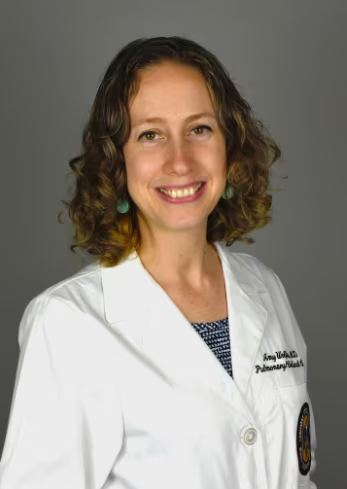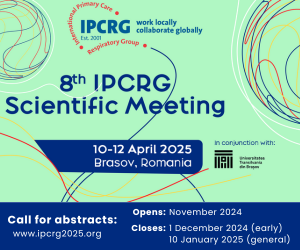Search Results
Showing Results for pre-COPD

Explore expert perspectives from ATS 2025 with our exclusive interview series. Discover key advances in respiratory care, including updates on COPD, ILD, ventilation strategies, and emerging therapies. Stay informed with concise, clinically relevant insights tailored for healthcare professionals on touchRESPIRATORY.

In this Q&A, Professors David Price and David Halpin discuss their ATS 2025 abstract on improving COPD outcomes through a digital adherence support package. They explore the MAGNIFY trial's design, including how an EMR-driven algorithm identified high-risk patients and how a pharmacist-led intervention combined with a digital inhaler device significantly reduced treatment failure in a real-world primary care setting.

Physician burnout is at a critical point. In this episode, Nicky speaks with Dr Alfred Atanda about why so many physicians are burning out and what can be done to change the trend. From personal experience to system-wide solutions, Dr Atanda shares valuable insights on improving physician well-being and building a more effective healthcare culture.

In this episode, we explore the future of continuing medical education (CME) with the team behind touchIME. Hannah Fisher and Matthew Goodwin share insights into global and US trends, the importance of patient inclusivity and how educational outcomes are evolving to better measure the direct impact of learning on clinical practice and patient care.

Improving Access and Outcomes in Pulmonary and Critical Care: A Q&A with Future Leader, Dr Amy Wolfe
As part of our Future Leaders series, we spoke with Dr Amy Wolfe, Director of the LSUHSC-Wetmore TB Clinic and Assistant Professor of Medicine at LSUHSC in New Orleans. A specialist in pulmonary and critical care medicine, Dr Wolfe shares how her early experiences in post-Katrina New Orleans inspired her focus on health equity. She discusses the challenges of treating TB in underserved communities, the importance of wraparound care, and promising innovations in pulmonology—from AI-based diagnostics to expanded access to pulmonary rehabilitation and lung cancer screening.

In this episode, Professor Irene Higginson, Director of Better Health and Care Futures at King’s College London, discusses the complex challenges of managing breathlessness. She explores non-pharmacological strategies, the value of multidisciplinary care, and how the Breathlessness Support Services at KCL are transforming patient support. Tune in for expert insights and a look at future directions in breathlessness research and care.

Artificial intelligence is no longer a futuristic concept in respiratory care — it's already here, reshaping how we diagnose and manage asthma. In this insightful interview, Dr Alan Kaplan shares how AI is helping bridge long-standing gaps in asthma diagnosis, adherence, and disease control. From apps that can tell the difference between asthma and COPD, to smart inhalers that track medication use and predict exacerbations, Dr Kaplan explores the real-world potential of AI — and the challenges that come with it. He also weighs in on whether AI scribe software can enhance the patient–physician relationship, and what excites him most about the road ahead.

The International Primary Care Respiratory Group (IPCRG), is proud to host the 8th IPCRG Scientific Meeting in Brașov, Romania, on Friday 11 and Saturday 12 April 2025. This event, in partnership with the RespiRO team and the Transilvania University of Brașov promises to bring together researchers, innovators, and industry leaders to advance respiratory care in primary health settings.

As we observe World Lung Day, it is crucial to reflect on the escalating impact of respiratory diseases across the globe. Chronic respiratory diseases — including chronic obstructive pulmonary disease (COPD), asthma, lung cancer, pulmonary hypertension, obstructive sleep apnea, and others — continue to rank among the leading causes of morbidity and mortality worldwide. The World Health Organization’s latest data underscores the persistence of the global respiratory crisis:

The BETTER-B study, recently presented at ERS and published in The Lancet Respiratory Medicine, provided new insights into the management of severe breathlessness in patients with chronic respiratory diseases such as COPD and Interstitial Lung Disease (ILD). Severe breathlessness is a debilitating symptom that significantly impacts the quality of life for millions of people worldwide, yet there are currently no licensed medications to effectively address it outside of Australia. Given the clinical challenges and limited treatment options, clinicians often resort to off-label use of medications like mirtazapine, a widely prescribed antidepressant that appeared promising. Despite its initial promise, the study found that doses ranging from 15 to 45 mg of mirtazapine failed to provide significant relief compared to a placebo. Additionally, the findings highlighted potential adverse effects and increased healthcare costs associated with its use.

Welcome to the latest edition of touchREVIEWS in Respiratory & Pulmonary Diseases. As we continually strive to deliver cutting-edge research and insightful commentary, this issue is no exception, featuring a diverse array of articles that illuminate both emerging treatments and ...

Approximately half of all smokers will develop chronic obstructive pulmonary disease (COPD), with a disease progression over several years before the spirometric threshold for diagnosis is reached.1 There is, therefore, a clear benefit in identifying patients with COPD as early ...
Latest articles videos and clinical updates - straight to your inbox
Log into your Touch Account
Earn and track your CME credits on the go, save articles for later, and follow the latest congress coverage.
Register now for FREE Access
Register for free to hear about the latest expert-led education, peer-reviewed articles, conference highlights, and innovative CME activities.
Sign up with an Email
Or use a Social Account.
This Functionality is for
Members Only
Explore the latest in medical education and stay current in your field. Create a free account to track your learning.





